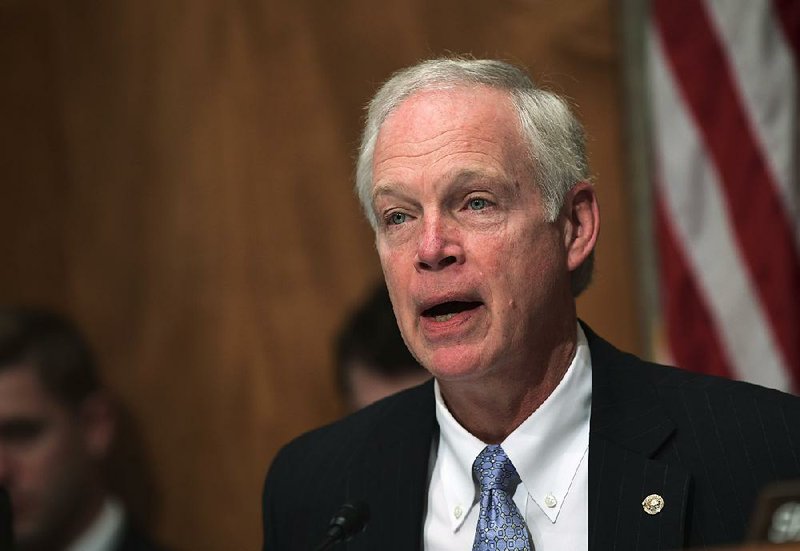WASHINGTON -- A key Senate Republican said Wednesday that he would not support the emerging GOP tax plan and another expressed reservations about the bill, as party leaders aim to use a slim Senate majority to pass an overhaul of the U.S. tax code.
Sen. Ron Johnson, R-Wis., said he was opposed to the new bill because it disproportionately benefits corporations at the expense of other businesses.
"If they can pass it without me, let them," Johnson said in an interview with the The Wall Street Journal. "I'm not going to vote for this tax package."
Johnson later said in a statement that he could support a version of the bill if significant changes are made.
Also Wednesday, Sen. Susan Collins, R-Maine, said she had major concerns about Republicans changing their tax bill to include language to repeal a key part of the Patient Protection and Affordable Care Act, saying that was a "mistake."
"This bill is a mixture of some very good provisions and some provisions I consider to be big mistakes," Collins said.
The warnings from Johnson and Collins cast doubt on whether Republicans can find enough support to pass their bill. The party controls 52 votes in the 100-seat Senate, and "no" votes from Collins and Johnson would mean that every other Republican would need to support the bill for it to pass. Should the vote split evenly, Vice President Mike Pence would vote in favor of the bill to break the tie.
The House, meanwhile, planned to vote on its version of the tax bill today.
"Big vote tomorrow in the House. Tax cuts are getting close!" Trump said in a tweet Wednesday night. "Why are Democrats fighting massive tax cuts for the middle class and business (jobs)? The reason: Obstruction and Delay!"
House Ways and Means Committee Chairman Kevin Brady, R-Texas, touted the legislation as providing tax breaks for millions of families and leaving companies with more money to produce more jobs.
"It represents a bold path forward that will allow us as a nation to break out of the slow-growth status quo once and for all," Brady said, as his chamber debated the bill Wednesday.
Still, there are several Senate Republicans who have not said how they will vote on the evolving bill. Sen. Bob Corker, R-Tenn., for example, has said in the past that he would not support a tax-cut bill that included provisions that expire, as the new GOP bill is designed. Asked Wednesday, Corker said he was still reviewing the bill.
Sen. John McCain, R-Ariz., repeatedly declined to say whether he'd vote for a tax bill that includes the proposed Republican change to the Affordable Care Act. McCain, who voted against a previous attempt to repeal the Affordable Care Act, said he wanted to review the tax bill as a whole.
EXPIRING DEDUCTIONS
Johnson's complaint centers on how the Senate bill would tax corporations versus other businesses.
The measure would permanently lower the corporate tax rate from 35 percent to 20 percent. But it would only temporarily create a new tax deduction for companies that pass through their income to shareholders through the individual income tax code, such as partnerships. Unless Congress acted later to extend those cuts, they would expire after 2025 and revert to the current tax system.
"These businesses truly are the engines of innovation and job creation throughout our economy, and they should not be left behind," Johnson said in a statement. "Unfortunately, neither the House nor Senate bill provide fair treatment, so I do not support either in their current versions."
By allowing those tax deductions to expire, it would increase taxes these companies pay by around $45 billion per year in 2026 and 2027, according to a forecast by the Joint Committee on Taxation. House Republicans' version of the tax legislation contains more generous, and permanent, tax cuts for these businesses.
The companies Johnson is referring to are often small businesses, but they can also be companies such as hedge funds, law firms and real estate companies. Some companies are treated differently from others in the Senate bill.
Johnson's complaints raise a new set of headaches for Republicans. They can't easily address his issues by cutting taxes for the companies he's concerned about, because doing that would make the tax package larger and add more to the national debt. Under the Senate rules they're trying to use to pass the bill, they can't add more tax cuts to the plan unless they offset those changes with other revenue increases.
On Wednesday, the committee shut down Democrats' efforts to modify the Senate bill, voting along party lines against amendments aimed at protecting health care coverage for veterans or people with disabilities, mental illness or opioid addiction if the insurance mandate is ended.
The committee did, however, approve a revision that provides a tax break for businesses that give their workers paid family leave.
The proposal by Sen. Deb Fischer, R-Neb., would give employers a tax credit equivalent to a percentage of the wages paid to employees while on family or medical leave. The idea is to encourage paid time for employees to deal with family responsibilities, relieving some financial pressure.
Senate GOP leaders are hoping to pass their new version of the bill through the Senate Finance Committee this week and take a final version of the bill to the Senate floor the week after Thanksgiving. But growing opposition could scuttle those plans, and GOP leaders have had a hard time corralling members on tough votes this year, failing several times to get enough support on health care bills.
The GOP unrest comes as Senate Democrats denounce the late-Tuesday changes that Republicans made to their tax cut bill, saying the new GOP plans would further punish the middle class.
The new GOP additions to the bill would repeal the individual mandate of the Affordable Care Act and force all tax cuts for individuals and families to expire after 2025. Cuts to the corporate tax rate, however, would be permanent under the bill.
Democrats spent Wednesday blasting Republicans for forcing through last-minute changes that they say almost all hurt the middle class.
"Why do people think this is a swamp?" said Sen. Mark Warner, D-Va. "This is Swamp 101."
Treasury Secretary Steve Mnuchin, meeting with lawmakers on Capitol Hill, told reporters that the tax bill would make business cuts permanent because companies need long-term assurances of their tax rates for planning purposes.
He also shrugged off concerns that the public would balk at a bill that, as written, would provide only temporary tax cuts to individuals. Mnuchin, echoing other Republicans, predicted that the individual tax cuts would eventually be extended or made permanent.
"I don't think it's an optics issue," Mnuchin said. "I think people understand that we'll fix the personal side."
But it's unclear how they can address Johnson's complaints, at least before the finance committee's planned vote on the bill today.
The Senate debate at times Wednesday grew heated.
At a committee hearing to debate the changes, Senate Finance Committee Chairman Orrin Hatch, R-Utah, lashed into Sen. Michael Bennet, D-Colo., for complaining about possible entitlement cuts, saying it's Democrats who refuse to cut spending.
At one point, Hatch said he was sick of Democrats pursuing ways to add government spending while simultaneously lecturing Republicans about adding to the debt.
"I've had enough of that to last me the rest of my life," he said.
ENTITLEMENT PROGRAMS
Some Democrats warned that the tax rewrite will ultimately be financed by gutting entitlement programs such as Social Security and Medicare.
That possibility appeared more likely Tuesday, after the Congressional Budget Office said the tax bill could set off an arcane budget rule that would make deep cuts to Medicare over the next decade.
"This is a nasty, two-step strategy that has long been the holy grail for hard-right Republicans," said Sen. Charles Schumer, D-N.Y., the minority leader. "If this bill passes, you can bet the Republicans will immediately sharpen the knives for middle-class benefits."
The budget office said a law passed in 2010 would necessitate cuts to Medicare of as much as $25 billion next year. The law requires that legislation that adds to the federal deficit be paid for with spending cuts or other offsets. If that does not happen, automatic cuts to programs like Medicare kick in.
The Medicare cuts, which are capped at 4 percent of the program's annual spending, could reach almost a half-trillion dollars over 10 years, according to the nonpartisan Committee for a Responsible Federal Budget.
The cuts can be averted through bipartisan legislation, though it is unclear whether Republicans would go along with such workarounds.
In recent weeks, Republican leaders have started to indicate that if they succeed in passing tax cuts, they will, in fact, look to overhaul government welfare programs.
Brady, as chairman of the House Ways and Means Committee, said this month that a tax overhaul "alone won't get us back to a balanced budget." He said House Republicans would soon turn toward "welfare reform and tackling the entitlements."
Top White House officials have also suggested that the administration is willing to get on board with entitlement changes. In an interview with CNBC last week, Gary Cohn, director of the National Economic Council, said the president was focused on taxes, deregulation and infrastructure, and that changes to safety-net programs would follow.
"I think when he gets done with those, I think welfare is going to come up," Cohn said.
The GOP effort to pass a tax overhaul appeared to be sailing through Congress until the late change by Senate Republicans on Tuesday, when they decided to include the provision that would repeal the individual mandate. This change would free up more than $300 billion in additional money that Republicans can use to offset their tax cuts, but it also laid bare the difficult budgeting process they face as they try to craft a bill.
Senate rules allow the tax-cut bill to raise the deficit by no more than $1.5 trillion over 10 years. The Senate also is prohibited from passing a bill that would add to the deficit after 10 years unless there is bipartisan support. That's because the chamber is trying to pass the tax-cut measure through a process known as reconciliation, which allows changes with just a simple majority of votes in the Senate. Otherwise, they need 60 votes to pass a broader bill, and Republicans control only 52 of the Senate's 100 seats.
Information for this article was contributed by Damian Paletta and Mike DeBonis of The Washington Post; by Alan Rappeport of The New York Times; and by Marcy Gordon, Kevin Freking, Andrew Taylor, Ricardo Alonso-Zaldivar, Catherine Lucey and Alan Fram of The Associated Press.
A Section on 11/16/2017

